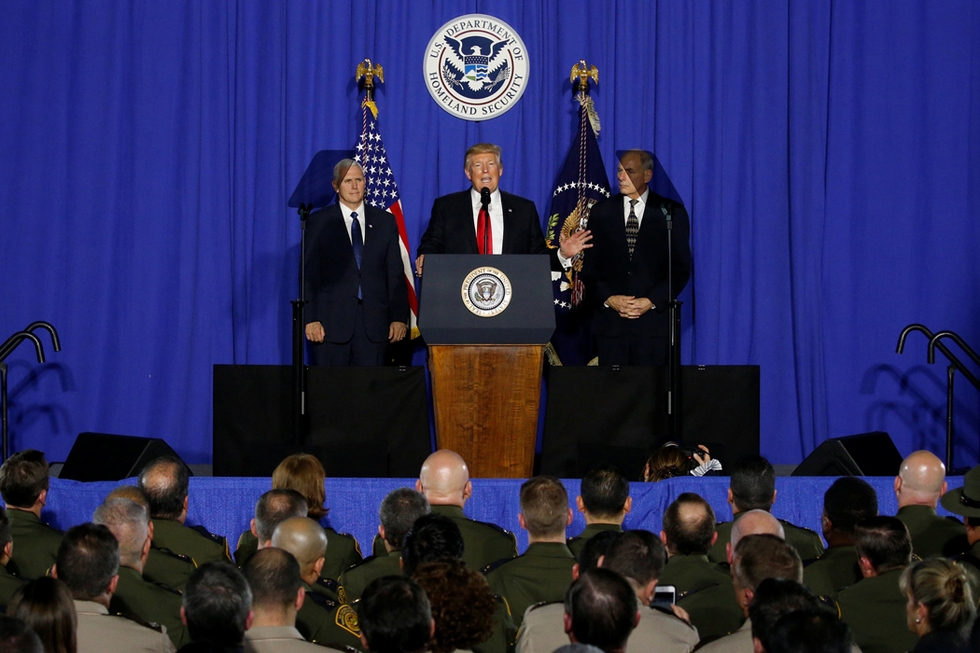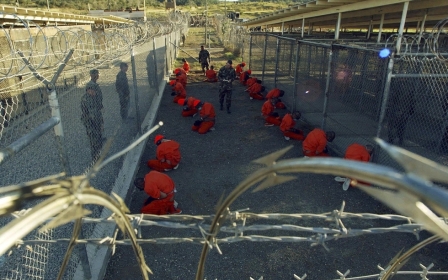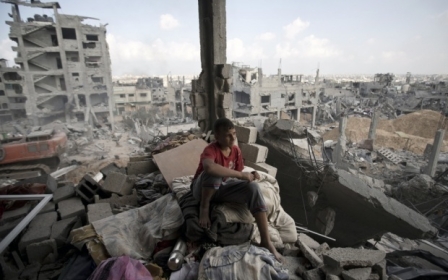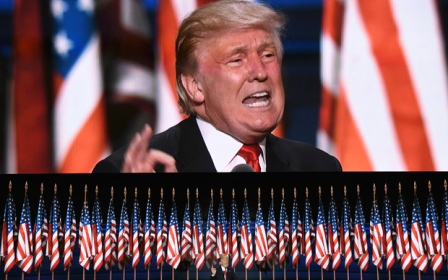Trump signs orders to build border wall, bolster immigration police

US President Donald Trump signed directives on Wednesday to build a wall along the US-Mexican border and strip funding from cities that shield undocumented immigrants, as he charged ahead with sweeping and divisive plans to transform how the US deals with immigration and national security.
The Republican president is expected to take additional steps in the coming days to limit legal immigration, including executive orders restricting refugees and blocking the issuing of visas to people from several Muslim-majority Middle Eastern and North African countries. Syria, Sudan, Somalia, Iraq, Iran, Libya and Yemen are the countries identified so far.
The intent of those proposals, as outlined by the Trump administration, is to head off religious violence in the US, although critics have said it soils America's reputation as a welcoming place for immigrants of all stripes.
In an interview with ABC aired on Wednesday night, Trump confirmed the ban plans.
"They're ISIS; They're coming under false pretences; I don't want that," Trump said of refugees.
Asked about potential bans on immigrants from Saudi Arabia, Afghanistan and Pakistan, Trump said "extreme vetting" will be in place for all countries.
Trump signed two executive orders, directing the construction of a wall along the roughly 3,200km US-Mexico border, moving to peel away federal grant money from "sanctuary" states and cities that harbour undocumented immigrants, and beefing up the force of immigration agents.
"We are in the middle of a crisis on our southern border: the unprecedented surge of undocumented migrants from Central America is harming both Mexico and the United States," Trump said in remarks at the Department of Homeland of Security after signing the directives.
"And I believe the steps we will take starting right now will improve the safety in both of our countries," Trump said, adding: "A nation without borders is not a nation."
Costly projections
Part of the border - 1050km - already features fencing that blocks people and/or vehicles. But just building 665km more of fencing would cost $11.4bn, according to the Washington Office on Latin America, a non-profit research and rights group that cited an estimate by US Customs and Border Protection.
Trump himself has been vague about the cost. His estimates have ranged from $4bn to "around $10bn". But some architects and engineers have said it would cost much more.
In an article entitled "Bad Math Props up Trump's Border Wall," MIT Technology Review estimated late last year that a 1,600km steel and concrete wall would cost $27bn to $40bn.
The review put it this way: "Set aside the questions of whether it's wise to put a wall along the US-Mexico border or who should pay for it. It simply can't be done at the price Donald Trump has claimed."
His plans prompted an immediate outcry from immigrant advocates and other critics who said Trump was jeopardising the rights and freedoms of millions of people, while treating Mexico as an enemy, not an ally.
Crackdown on 'sanctuary cities'
Trump also said his administration would crack down on sanctuary cities in the US that protect undocumented immigrants.
Some 300 such cities, counties or states - from New York to Los Angeles - exist throughout the US, and many of them have vowed since Trump's election to protect an estimated 11 million undocumented migrants living in the country.
The term refers to Americans cities, counties or states - such as New York or California - that protect undocumented immigrants from deportation by refusing to assist or cooperate with federal immigration officials. Such cities normally do not allow local police to inquire about the immigration status of people with whom they interact.
They also refuse to detain people brought to them by immigration authorities or to keep suspected undocumented immigrants in jail beyond their scheduled release date.
Local officials in "sanctuary cities" such as New York, Los Angeles, Chicago, Philadelphia, Boston, Denver, Washington, San Francisco and Seattle offer some forms of protection to undocumented immigrants. Billions of dollars in federal aid to those cities, often governed by Democrats, could be at risk.
Los Angeles became one of the first sanctuary cities in 1979 after numerous faith communities began offering shelter to refugees fleeing conflict in Central America and who could not get asylum.
Jessica Vaughan, director of policy studies at the Center for Immigration Studies, said some of these cities, like New York, Chicago and San Francisco, have simply cut ties with federal immigration officials and refuse to cooperate with them.
The decree signed by Trump on Wednesday threatens to withhold federal funds from cities that refuse to cooperate with immigration officials.
Such funds can represent a considerable chunk of a city's budget. According to CNN, New York alone stands to lose more than $10bn in federal funds for social services and other programmes.
"The American people are no longer going to have to be forced to subsidise this disregard for our laws," White House spokesman Sean Spicer said.
In an interview with ABC News on Wednesday, Trump said construction on the wall would start within months, with planning starting immediately, and that Mexico would pay back "100 percent" of the costs. Mexican officials have said they will not pay for the wall.
During a White House briefing, Spicer referred to the wall as "a large physical barrier on the southern border".
"Building this barrier is more than just a campaign promise, it's a common-sense first step to really securing our porous border," Spicer added. "This will stem the flow of drugs, crime, illegal immigration into the United States."
Trump's actions could fundamentally change the American stance on immigration, as well as further testing relations with Mexico.
'This will stem the flow of drugs, crime, illegal immigration into the United States' - Sean Spicer
'Border wall is about political theatre'
Spicer said Trump's goal was to get the wall project started as quickly as possible using existing government funds and then work with the Republican-led Congress on further appropriations.
"We'll be reimbursed at a later date from whatever transaction we make from Mexico," Trump told ABC on Wednesday. "I'm just telling you there will be a payment. It will be in a form, perhaps a complicated form. What I'm doing is good for the United States. It's also going to be good for Mexico. We want to have a very stable, very solid Mexico."
Trump made cracking down on undocumented immigration a key element of his presidential campaign, with supporters at his rallies often chanting: "Build the wall!"
"The border wall is about political theatre at the expense of civil liberties," said Christian Ramirez, director of the Southern Border Communities Coalition immigrant advocacy group.
"It is not national security policy. Border communities are among the safest in the nation and patrolling them with tens of thousands of heavily armed, poorly trained, unaccountable agents puts lives at risks. This will turn these communities into de facto military zones," Ramirez said.
'The border wall is about political theatre at the expense of civil liberties' - Christian Ramirez
Ramping up border security
Many Democrats have opposed the plan and could try to thwart any congressional legislation to pay for the wall, although Republicans control both the Senate and House of Representatives.
Trump said his directive would also end the practice known by critics as "catch and release" in which authorities apprehend undocumented immigrants on US territory, but do not immediately detain or deport them.
The directives also include hiring 5,000 more US Customs and Border Protection agents used to apprehend people seeking to slip across the border and tripling the number of US Immigration and Customs Enforcement agents used to arrest and deport immigrants living in the US without documentation.
They also would create more detention space for undocumented immigrants along the southern border to make it easier and cheaper to detain and deport them.
Many Americans view their country with pride as "a nation of immigrants," and President John F Kennedy wrote a book with that title more than half a century ago. Trump successfully tapped into resentment toward the roughly 11 million undocumented immigrants already in the United States and said during the campaign he would deport them all.
Trump, who in announcing his presidential bid in June 2015 accused Mexico of sending "rapists and criminals" into the United States, has also threatened to slap hefty taxes on companies that produce in Mexico for the US market, and to tear up the North American Free Trade Agreement (NAFTA) between Mexico, Canada and the United States.
Trump and Mexican President Enrique Pena Nieto are due to meet next week.
Asked about Trump's wall, Republican US Senator John McCain said a physical barrier was not enough to secure the border and called for the additional use of observation towers, drones and other technology.
"Walls can be easily breached," McCain, whose home state of Arizona borders Mexico, told MSNBC's "Morning Joe" program.
New MEE newsletter: Jerusalem Dispatch
Sign up to get the latest insights and analysis on Israel-Palestine, alongside Turkey Unpacked and other MEE newsletters
Middle East Eye delivers independent and unrivalled coverage and analysis of the Middle East, North Africa and beyond. To learn more about republishing this content and the associated fees, please fill out this form. More about MEE can be found here.




